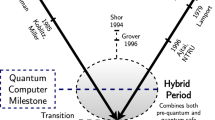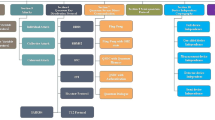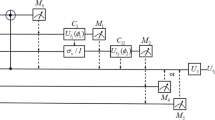Abstract
In this paper, a (t,n) threshold quantum secret sharing protocol for sharing quantum states is proposed by using rotation operation and Lagrange interpolation. In this protocol, according to Shamir’s (t,n) secret sharing, the dealer first shares a secret with n participants, and encrypts each quantum state through rotation operation. Then, each participant performs his encoding operation on each quantum state according to his share. Finally, the initial quantum states can be recovered by any t out of the n participants using Lagrange interpolation. The performance analysis shows that our protocol is correct and can resist some common external and internal attacks. Moreover, compared with related protocols, our protocol is more feasible with current technology. Furthermore, simulation experiments on the IBM Q Experience cloud platform demonstrate the effectiveness of the presented protocol.



Similar content being viewed by others
References
Bennett, C.H., Brassard, G.: Quantum cryptography: public key distribution and coin tossing. In: Proc. Int Conf. Comput. Syst. Signal Process., pp. 175–179. IEEE (1984)
Ekert, A.K.: Quantum cryptography based on Bell’s theorem. Phys. Rev. Lett. 67, 661 (1991)
Bostöm, K., Felbinger, T.: Deterministic secure direct communication using entanglement. Phys. Rev. Lett. 89, 187902 (2002)
Deng, F.G., Long, G.L.: Secure direct communication with a quantum one-time pad. Phys. Rev. A 69, 052319 (2004)
Xu, G., Xiao, K., Li, Z.P., et al.: Controlled secure direct communication protocol via the Three-Qubit partially entangled set of states. Comput. Mater. Con. 58, 809–827 (2019)
Zhang, L., Dong, S., Zhang, K.: A controller-independent quantum dialogue protocol with four-particle states. Int. J. Theor. Phys. 58, 1972–1936 (2019)
Lin, S., Zhang, X., Guo, G.D., et al.: Multiparty quantum key agreement. Phys. Rev. A 104, 042421 (2021)
Wang, S.S., Jiang, D.H., Xu, G.B., et al.: Quantum key agreement with bell states and cluster states under collective noise channels. Quantum Inf. Process. 18, 190 (2019)
Wang, W., Zhou, B.M., Zhang, L.: The three-party quantum key agreement protocol with quantum fourier transform. Int. J. Theor. Phys. 59, 1944–1955 (2020)
Hillery, M., Bužek, V., Berthiaume, A.: Quantum secret sharing. Phys. Rev. A 59, 1829–1834 (1999)
Karlsson, A., Koashi, M., Imoto, N.: Quantum entanglement for secret sharing and secret splitting. Phys. Rev. A 59, 162–168 (1999)
Cleve, R., Gottesman, D., Lo, H.K.: How to share a quantum secret. Phys. Rev. Lett. 83(3), 648–651 (1999)
Deng, F.G., Li, X.H., Li, C.Y., et al.: Multiparty quantum-state sharing of an arbitrary two-particle state with Einstein-Podolsky-Rosen pairs. Phys. Rev. A 72, 044301 (2005)
Liu, W.T., Liang, L.M., Li, C.Z., et al.: Scalable quantum secret sharing extended from quantum key distribution. Chin. Phys. Lett. 24(5), 1147–1150 (2007)
Zhang, K., Zhang, X., Jia, H., Zhang, L.: A new n-party quantum secret sharing model based on multiparty entangled states. Quantum Inf. Process. 18, 21 (2019)
Tokunaga, Y., Okamoto, T., Imoto, N.: Threshold quantum cryptography. Phys. Rev. A 71(1), 012314 (2005)
Sun, Y., Xu, S.W., Chen, X.B., et al.: Expansible quantum secret sharing network. Quantum Inf. Process. 12, 2877–2888 (2013)
Jia, H.Y., Wen, Q.Y., Gao, F., et al.: Dynamic quantum secret sharing. Phys. Lett. A 376, 1035–1041 (2012)
Deng, F.G., Li, X.H., Li, C.Y., et al.: Multiparty quantum-state sharing of an arbitrary two-particle state with Einstein-Podolsky-Rosen pairs. Phys. Rev. A 72, 044301 (2005)
Karimipour, V., Marvian, M.: Secure quantum carriers for quantum state sharing. Int. J. Quantum Inf. 10(2), 1250018 (2012)
Qin, H., Zhu, X., Dai, Y.: (t, n) Threshold quantum secret sharing using the phase shift operation. Quantum Inf. Process. 14, 2997–3004 (2015)
Cao, H., Ma, W.P.: (t, n) Threshold quantum state sharing scheme based on linear equations and unitary operation. IEEE Photonics J. 9(1), 7600207 (2017)
Lu, C.B., Miao, F.Y., Meng, K. J., Yu, Y.: Threshold quantum secret sharing based on single qubit. Quantum Inf. Process. 17, 64 (2018)
Sutradhar, K., Om, H.: Efficient quantum secret sharing without a trusted player. Quantum Inf. Process. 19, 73 (2020)
Qin, H., Tso, R., Dai, Y.: Multi-dimensional quantum state sharing based on quantum fourier transform. Quantum Inf. Process. 17, 48 (2018)
Deng, F., Li, X., Zhou, H., et al.: Improving the security of multiparty quantum secret sharing against trojan horse attack. Phys. Rev. A 72(4), 044302 (2005)
Shamir, A.: How to share a secret. Commun. ACM. 22, 612–613 (1979)
Blakley, G.R.: Safeguarding cryptographic keys. IEEE Computer Society. In: AFIPS, p. 313 (1979)
Cai, B.B., Guo, G.D., Lin, S.: Multi-party quantum key agreement ith out entanglement. Int. J. Theor. Phys. 56, 1039–1051 (2017)
D’Ariano, G.M., Presti, P.L., Paris, M.G.A.: Improved discrimination of unitary transformations by entangled probes. J. Opt. B: Quantum Semiclass. Opt. 4, 273 (2002)
Xu, G., Jiang, D.: Novel methods to construct nonlocal sets of orthogonal product states in an arbitrary bipartite high-dimensional system. Quantum Inf. process. 20, 128 (2021)
Helstrom, C.W.: Quantum Detection and Estimation Theory. Academic Press (1976)
Craciun, V.C., Mogage, A., Simion, E.: Trends in design of ransomware viruses. Int. Conf. Secur. Inf. Technol. Commun., pp 259–272. Springer, Berlin (2018)
Mohurle, S., Patil, M.: A brief study of wannacry threat: ransomware attack 2017. Int. J. Adv. Res. Comput. Sci. 8(5), 1938–1940 (2017)
Li, X.H., Deng, F.G.: Improving the security of secure direct communication based on the secret transmitting order of particles. Phys. Rev. A 74, 054302 (2006)
Chefles, A., Barnett, S.M.: Optimum unambiguous discrimination between linearly independent symmetric states. Phys. Lett. A 250, 223–229 (1998)
Lu, C.B., Miao, F.Y., Hou, J.P., Su, Z.F., Xiong, Y.: Quantum multiparty cryptosystems based on ahomomorphic random basis encryption. Quantum Inf. Process. 19, 293 (2020)
Raynal, P.: Unambiguous state discrimination of two density matrices in quantum information theory. arXiv:quant-ph/0611133 (2006)
Zyczkowski, K., Sommers, H.J.: Average fidelity between random quantum states. Phys. Rev. A 71, 032313 (2005)
Acknowledgements
This work was supported by National Natural Science Foundation of China (Grants No. 61772134, No. 61976053, and No. 62171131), Fujian Province Natural Science Foundation (Grant No. 2018J01776), and Program for New Century Excellent Talents in Fujian Province University.
Author information
Authors and Affiliations
Corresponding author
Additional information
Publisher’s Note
Springer Nature remains neutral with regard to jurisdictional claims in published maps and institutional affiliations.
Rights and permissions
About this article
Cite this article
Wang, N., Zhang, X., Zhang, X. et al. (t,n) Threshold Quantum Secret Sharing Using Rotation Operation. Int J Theor Phys 61, 166 (2022). https://doi.org/10.1007/s10773-022-05121-x
Received:
Accepted:
Published:
DOI: https://doi.org/10.1007/s10773-022-05121-x




